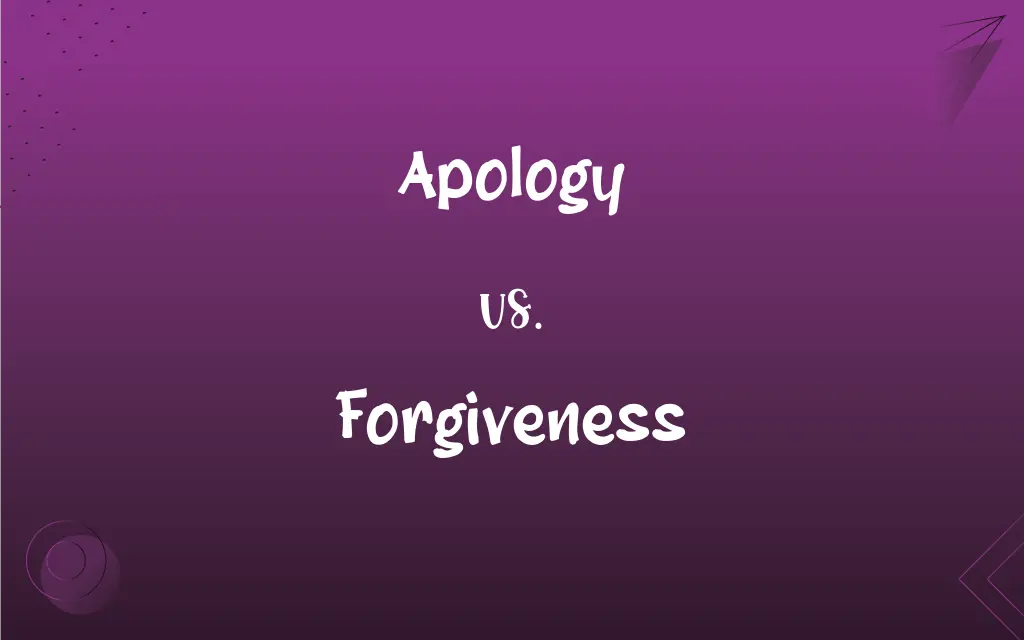Apology vs. Forgiveness: What's the Difference?
Edited by Harlon Moss || By Janet White || Published on December 4, 2023
Apology is an expression of regret for having caused inconvenience, hurt, or harm. Forgiveness is the act of pardoning someone for their mistake or wrongdoing.

Key Differences
An apology is an admission of wrongdoing or fault, often accompanied by an expression of regret or remorse. While, forgiveness is the response to an apology, where the offended party chooses to let go of resentment.
An apology is an action taken by the person who did the wrong, while forgiveness is the action of the person who was wronged. Apologizing is about acknowledging fault; forgiving is about releasing anger or hurt.
An apology does not automatically result in forgiveness. Apologizing is a step towards making amends, but forgiveness is a separate process that depends on the person who was harmed.
Apologies can be offered for a variety of reasons, including social etiquette, genuine remorse, or a desire to make amends. Forgiveness can be motivated by compassion, a desire for reconciliation, or personal peace.
Both apologies and forgiveness are crucial for healing and maintaining relationships, but they play different roles. An apology seeks to acknowledge and repair harm, while forgiveness seeks to overcome resentment and hurt.
ADVERTISEMENT
Comparison Chart
Initiator
The person who committed the wrong
The person who was wronged
Purpose
To express regret or remorse
To pardon or let go of resentment
Dependency
Can be offered independently
Often depends on receiving an apology
Outcome
Not guaranteed to repair the relationship
Can lead to reconciliation and healing
Emotional Focus
Guilt and responsibility
Release of anger and hurt
ADVERTISEMENT
Apology and Forgiveness Definitions
Apology
Expression of regret for wrongdoing.
His apology for the misunderstanding was sincere.
Forgiveness
Letting go of resentment or anger.
Forgiveness helped him move past the betrayal.
Apology
Acknowledgment of causing harm or offense.
She sent an apology letter to her friend.
Forgiveness
Releasing blame towards someone.
Forgiveness was essential for their relationship's recovery.
Apology
A formal expression of regret.
The company issued an official apology for the error.
Forgiveness
Choosing peace over holding a grudge.
Through forgiveness, she found inner peace.
Apology
A statement of remorse for one's actions.
The public apology was broadcasted on TV.
Forgiveness
Act of pardoning someone for a mistake.
She found it in her heart to offer forgiveness.
Apology
An attempt to make amends for a mistake.
He offered an apology and a bouquet of flowers.
Forgiveness
A personal process of overcoming hurt.
His forgiveness was a step towards healing.
Apology
An acknowledgment expressing regret or asking pardon for a fault or offense
Please accept my apology for being so late.
Forgiveness
The act of forgiving; pardon.
Apology
A formal justification or defense.
Forgiveness
The action of forgiving.
He begged for forgiveness after being caught stealing from the shop.
Forgiveness
Readiness to forgive.
Forgiveness
The act of forgiving; the state of being forgiven; as, the forgiveness of sin or of injuries.
To the Lord our God belong mercies and forgivenesses.
In whom we have . . . the forgiveness of sin.
Forgiveness
Disposition to pardon; willingness to forgive.
If thou, Lord, shouldest mark iniquities, O Lord, who shall stand? But there is forgiveness with thee, that thou mayest be feared.
Forgiveness
Compassionate feelings that support a willingness to forgive
Forgiveness
The act of excusing a mistake or offense
FAQs
Is forgiveness always necessary?
It's a personal choice, not always necessary but often beneficial.
What constitutes a sincere apology?
Acknowledgment of harm and genuine expression of remorse.
Can an apology be non-verbal?
Yes, through actions that demonstrate remorse.
How can an apology be made meaningful?
By ensuring it's sincere and followed by corrective actions.
Does forgiveness mean forgetting?
No, it's about letting go of resentment, not forgetting the incident.
Should apologies always be accepted?
Not necessarily; it depends on the sincerity and the situation.
Can you forgive without an apology?
Yes, forgiveness can be for personal peace, regardless of an apology.
Can an apology repair a broken relationship?
It can help, but it's not a guarantee; other factors also play a role.
Does forgiveness require reconciliation?
Not always; one can forgive without continuing the relationship.
How should one respond to an apology?
It depends on personal feelings: acknowledgment, acceptance, or discussion.
Is forgiveness a sign of weakness?
No, it's often considered a strength and a virtue.
How often should one apologize?
Whenever one recognizes their own wrongdoing or hurt caused.
Does forgiveness mean trust is restored?
Not automatically; trust may need to be rebuilt over time.
What if an apology seems insincere?
It's valid to question its sincerity and respond accordingly.
Can forgiveness be conditional?
Sometimes, it can depend on the offender's future actions.
Are there health benefits to forgiveness?
Yes, including reduced stress and improved mental health.
Is it okay to refuse forgiveness?
Yes, it's a personal choice based on individual feelings and circumstances.
What are the benefits of apologizing?
It can lead to healing, reconciliation, and personal growth.
Can you apologize for unintentional harm?
Yes, acknowledging even unintended harm can be important.
Is forgiveness always a slow process?
It varies; for some, it's quick, for others, it takes time.
About Author
Written by
Janet WhiteJanet White has been an esteemed writer and blogger for Difference Wiki. Holding a Master's degree in Science and Medical Journalism from the prestigious Boston University, she has consistently demonstrated her expertise and passion for her field. When she's not immersed in her work, Janet relishes her time exercising, delving into a good book, and cherishing moments with friends and family.
Edited by
Harlon MossHarlon is a seasoned quality moderator and accomplished content writer for Difference Wiki. An alumnus of the prestigious University of California, he earned his degree in Computer Science. Leveraging his academic background, Harlon brings a meticulous and informed perspective to his work, ensuring content accuracy and excellence.






































































